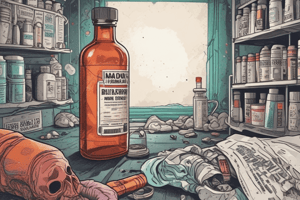Podcast
Questions and Answers
Who is the antagonist in 'The Possibility of Evil'?
Who is the antagonist in 'The Possibility of Evil'?
- Society (correct)
- The town
- Miss Strangeworth
- The roses
Who is the protagonist of 'The Possibility of Evil'?
Who is the protagonist of 'The Possibility of Evil'?
Miss Strangeworth
What is the theme of 'The Possibility of Evil'?
What is the theme of 'The Possibility of Evil'?
Evil can happen anywhere and can be perpetuated by individuals.
The external conflict in the story is person vs. society.
The external conflict in the story is person vs. society.
What setting is depicted in 'The Possibility of Evil'?
What setting is depicted in 'The Possibility of Evil'?
What simile is used in the story?
What simile is used in the story?
What do the roses symbolize in 'The Possibility of Evil'?
What do the roses symbolize in 'The Possibility of Evil'?
What is personification in the context of the story?
What is personification in the context of the story?
What is an example of foreshadowing in 'The Possibility of Evil'?
What is an example of foreshadowing in 'The Possibility of Evil'?
What do symbols represent in 'The Possibility of Evil'?
What do symbols represent in 'The Possibility of Evil'?
Flashcards are hidden until you start studying
Study Notes
Antagonist in "The Possibility of Evil"
- Society acts as the antagonist, in contrast to Miss Strangeworth's judgmental perspective on the otherwise happy lives of others.
- Miss Strangeworth's sense of superiority leads to a conflict with the community.
Protagonist
- Miss Strangeworth is the central character who demonstrates complex traits.
Theme
- Evil is omnipresent and can manifest anywhere, underscored by the anonymity of the town and the hypocrisy of Miss Strangeworth, who appears benevolent while enacting malevolence.
- Attempts to eliminate wickedness can result in creating it; Miss Strangeworth's actions lead to her own moral downfall.
- Power dynamics are explored, revealing how Strangeworth manipulates her reputation and influence.
- One individual can have significant negative impacts on a community.
External Conflict
- The main external conflict is Person vs. Society; Miss Strangeworth's negative actions stem from her misconstrued perceptions rather than direct provocations from others.
Setting
- The story takes place primarily in Miss Strangeworth's house and on a picturesque street, highlighting an ironic contrast between appearance and reality.
Simile
- "Old Lady Stangeworth's getting deaf, like a falling leaf" illustrates her detachment from reality.
- Descriptions of Miss Chandler evoke a sense of distraction and introspection.
Metaphor
- Roses symbolize Miss Strangeworth's public image and respect in the community, which ultimately becomes tarnished by her covert actions.
Personification
- The "possibility of evil" reflects Miss Strangeworth's internal conflicts, projecting her insecurities and malevolence onto her surroundings.
Foreshadowing
- The title itself hints at forthcoming malicious actions, setting the reader's expectations for a conflict.
- The unusual name "Adela Strangeworth" suggests her potential for bizarre behavior or wicked deeds.
- Miss Strangeworth's possessive remarks about the town and her roses indicate an underlying desire for control, foreshadowing negative events linked to her cherished possessions.
Symbols
- Roses represent deceptive beauty and the idea that outward appearances can be misleading; despite their beauty, they have hidden thorns, mirroring Miss Strangeworth's duality.
Studying That Suits You
Use AI to generate personalized quizzes and flashcards to suit your learning preferences.




